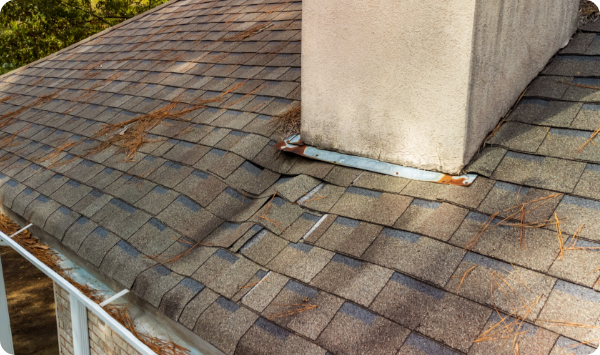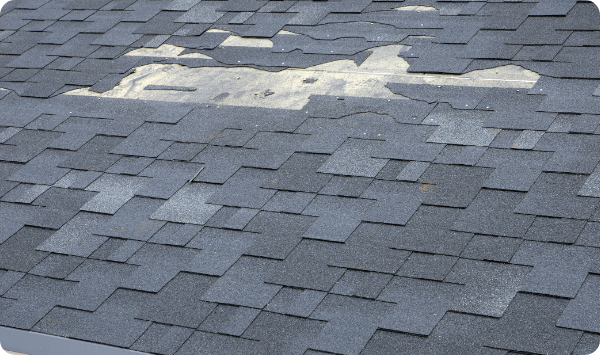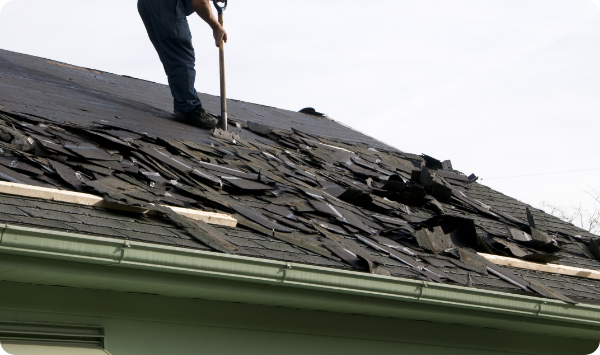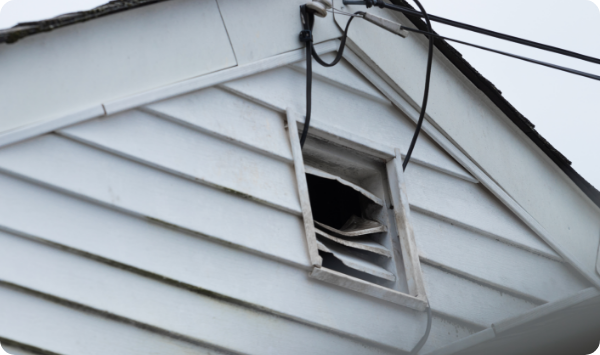Roof Replacement
Realizing you need a Roof Replacement Near Me? Taking on the job of replacing your roof is a big step for any homeowner. To get started, we look for key signs like missing or damaged tiles that show it's time for a renovation. Then, we help you pick the right roofing expert with the necessary credentials to protect your investment.
Navigating post-storm roof damage? We've got you covered there too. From initial inspections to dealing with insurance claims, we lay out every step to get your roof—and peace of mind—back. By staying tuned in, you'll pick up valuable insights to help you make smart decisions on this journey.
Find A Roofer
Fill out the form below and someone will get back to you as soon as possible
Common Roof Problems
Roof problems can vary widely in type and severity, affecting everything from the roof's appearance to its structural integrity. Some common issues that homeowners face include:

Leaks and Water Damage
Water intrusion is the most common and arguably the most damaging problem roofs can face. Leaks often occur around roof penetrations like chimneys, skylights, or vent pipes, as well as in valleys where two roof planes meet. If not addressed quickly, water can enter leading to mold, rot, and extensive interior damage.
Poor Installation and Maintenance
A roof's lifespan can be significantly shortened by poor installation or neglect. Faulty installation may lead to issues like improper shingle alignment, inadequate ventilation, and insufficient sealing, all of which can compromise the roof's effectiveness and durability. Regular maintenance is important in identifying and addressing minor issues before they escalate.


Storm and Wind Damage
High winds and storms can tear off roof shingles or cause trees and debris to fall on the roof, leading to immediate and severe damage. After any significant weather event, it's essential to inspect the roof for signs of distress and secure any necessary repairs to avoid further damage.
Pest Infestations
Pests, such as rodents, birds, and insects, can cause substantial damage to roofs by nesting, chewing, or pecking at roofing materials. Over time, this can lead to vulnerabilities in the roof's structure, leading to repairs or full replacement.
Understanding these common problems can help homeowners stay alert and proactive in maintaining their homes' roofs, ultimately extending the lifespan of one of their biggest investments.

Signs You May Need a Roof Replacement
Wondering if your home needs a new roof? The typical lifespan of an asphalt shingle roof hovers around 20-25 years. Beyond this age, keep an eye out for these signs of damage.
-
Missing or Damaged Shingles
If your roof is showing signs of significant wear and tear, take action quickly. Missing or visibly damaged shingles are not just unsightly; they're open invitations for water leaks and further damage inside your home. This is one of the clearest indicators that you might need to call in a roofing contractor.
-
Buckling and Curling Shingles
Buckling and curling shingles can compromise the structural integrity of the entire system. The warped and twisted shapes of your roof tiles frequently hint at deeper problems, like too much warmth or water which can be hiding underneath them.
-
Spongy Texture When Walked On
A spongy feel under your feet suggests underlying moisture has begun wreaking havoc, leading to potential decay deep within your roofing structure.
-
Discoloration and Algae Growth
Another sign that a roof may need replacing is the presence of widespread discoloration or algae growth. These issues do not just affect the aesthetic appeal of your home; they can indicate moisture retention in the roof materials, potentially leading to rot and decay. Algae growth, in particular, thrives in damp conditions and can weaken shingles, making them more susceptible to damage over time.
-
Granule Loss on Shingles
Over time, asphalt shingles can lose their granules—those small, sand-like particles that coat the surface of the shingle. This loss often becomes evident in gutters where granules accumulate after being washed off the roof by rainwater.
Granule loss exposes the underlying bitumen material to the elements, accelerating the wear and tear process. If you notice significant granule loss, it's a strong indicator that your roof’s protective layer is compromised and may require replacement.
Choosing the Right Roofing Contractor

Finding a roofing contractor you can trust is like choosing a good mechanic; it’s all about reliability, expertise, and fair pricing. When your home needs a quality roof replacement, don’t just go with the first name. Make sure you are working with GAF-certified contractors to ensure your project is in skilled hands.

Importance of Certification and Warranties
Selecting a GAF-certified contractor isn't just checking off a box—it's ensuring peace of mind for one of your most significant investments. North America's largest roofing manufacturer stands behind its certification program because these contractors meet strict installation practices. This means when disaster strikes—be it storm winds or relentless UV radiation—you’re covered by some of the strongest guarantees and warranties in the industry.
Moreover, working with GAF-certified professionals gives homeowners access to top-tier materials and quality that lasts years beyond what non-certified teams might offer. Addressing roof issues goes beyond repairs like plugging leaks or swapping out lost tiles; it's about increasing its market value.
In essence, navigating through roofing companies requires more than just comparing quotes—it demands looking at credentials and understanding warranty implications thoroughly before making any commitments.
Questions to Ask Your Roofing Contractor About Roof Replacement
When you're ready to discuss a roof replacement with potential contractors, knowing the right questions to ask can make a significant difference in the outcome of your project. Here are some inquiries to help you gather important information and make an informed choice:
-
How long have you been in the roofing business?
Experience matters when it comes to complex and critical work like roof replacement. It's beneficial to choose a contractor with a solid track record.
-
Can you provide local references?
Hearing from other homeowners in your area who have worked with the contractor can offer insights into their reliability and the quality of their work.
-
Do you have insurance and licensing?
It's important to ensure that the contractor has liability insurance and is licensed to work in your state. This protects you from potential legal issues or liabilities in case of accidents.
-
What warranties do you offer?
Understanding the warranties provided, both for materials and the installation work, is essential. It gives you an idea of what expectations to have regarding the longevity and repair coverage for your new roof.
-
Will you conduct a thorough inspection?
A reputable contractor should be willing to inspect not just the surface but also the decking and ventilation system to ensure your entire roofing system is in good shape.
-
How will you protect my property during the job?
Roof replacements can be messy. Ask how they plan to protect your landscaping, driveways, and other areas of your property during the work.
-
What is your process for dealing with unexpected issues?
Understanding how the contractor deals with unforeseen problems, like discovering rotted wood, ensures there are no surprises regarding additional costs or extended project timelines.
-
Can you provide a written estimate?
A detailed estimate should break down the costs of materials, labor, and any other charges. This transparency allows you to compare bids accurately and avoids unexpected expenses.
Choosing the right contractor for your roof replacement is important for ensuring the job is done right and protects your home for years to come. Take the time to ask these questions and any others you may have to feel confident in your hiring decision.
Handling Roof Damage After a Storm
Initial Inspection and Contacting Insurance
The first step after a storm has quieted is to perform an initial inspection of your roof. Look for visible signs like missing shingles or water leaks, indicating the need for emergency roof repairs. Once you've assessed the damage, contact your insurance company. Keeping a detailed record of all damages can smooth out the process ahead.
BBB's Home HQ advises homeowners to start by inspecting their living spaces, including checking around vent stacks in attics and looking at ceilings for any signs of water intrusion. Carrying out this self-evaluation can prepare you for a smooth conversation with your insurer.
Obtaining Multiple Estimates
Finding reputable roofing companies for estimates is next on your list. It helps you get fair pricing and quality service from contractors experienced with asphalt shingles or whichever roofing materials are appropriate for your home needs.
Gathering several estimates allows you not only to compare prices but also gauge which contractor understands emergency repair processes thoroughly—something important if wind damage has left parts of your roof exposed.
Filing an Insurance Claim
Navigating through filing an insurance claim requires patience and attention to detail. Each interaction with both the insurance adjuster meeting and eventual contractors should be documented.
Make sure every discussion about replacement cost factors, installation practices, or even temporary fixes until permanent repairs can be made is noted.
This detailed approach usually speeds up claims processing, helping you get back on track quicker if disaster strikes again.
FAQs about Roof Replacement Near Me
-
What does GAF certified roofer mean?
A GAF-certified roofer has passed stringent standards set by North America's largest roofing manufacturer, with top-notch service and reliability.
-
What is GAF Master Elite?
GAF Master Elite is a status given to less than 2% of roofers. It means they deliver the best craftsmanship, backed by the strongest warranties.
-
How do you fix a flat roof?
To fix a flat roof, first find leaks or damage. Then clean the area and apply patching material or replace sections if needed. Always ensure proper drainage.
Ensure Your Roof's Integrity By Making Informed Decisions
Maintaining the integrity of your roof is not only about preserving the aesthetic appeal of your home but also about ensuring its safety, efficiency, and durability over time. From identifying early signs of damage to selecting the right roofing contractor and navigating insurance claims post-storm damage, informed decision-making is important.
By staying proactive about regular inspections and maintenance, homeowners can extend the lifespan of their roofs and protect their homes against the unpredictabilities of nature and time.
Find A Roofer
Fill out the form below and someone will get back to you as soon as possible